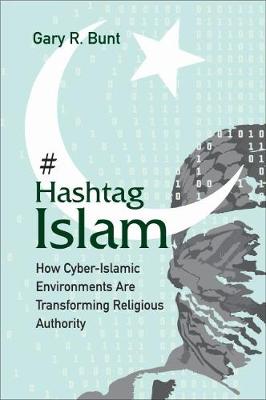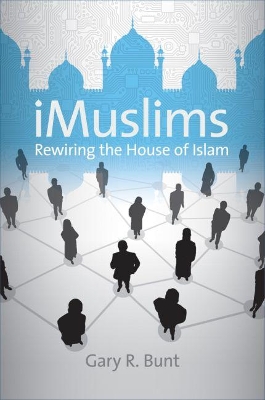Islamic Civilization and Muslim Networks
3 total works
The internet has profoundly shaped how Muslims perceive Islam, and how Islamic societies and networks are evolving and shifting within the twenty-first century. While these electronic interfaces appear new and innovative in terms of how the media is applied, much of their content has a basis in classical Islamic concepts, with an historical resonance that can be traced back to the time of the Prophet Muhammad. "I-Muslims" explores how these transformations and influences play out in diverse cyber Islamic environments, and how they are responding to shifts in technology and society. This book discusses how, in some contexts, the application of the internet has had an overarching transformational effect on how Muslims practice Islam, how forms of Islam are represented to the wider world, and how Muslim societies perceive themselves and their peers.On one level, this may be in terms of practical performance of Islamic duties and rituals, or on the interpretation and understanding of the Qur'an.
On another level, cyber Islamic environments have exposed Muslims to radical and new influences outside of traditional spheres of knowledge and authority, causing long-standing paradigmatic shifts at a grassroots level within societies. "I-Muslims" looks at how these changes are taking place, including through social networking sites and the blogosphere. This book also explores how the internet has dramatically influenced jihad-oriented campaigns by networks such as al-Qaeda, and has made a significant difference to how forms of Islamic activism and radicalization have been engendered. This book concludes by determining the way forward for the articulation of diverse understandings of Islam online, and how Muslim networks will be further shaped through their relationships with the internet.
On another level, cyber Islamic environments have exposed Muslims to radical and new influences outside of traditional spheres of knowledge and authority, causing long-standing paradigmatic shifts at a grassroots level within societies. "I-Muslims" looks at how these changes are taking place, including through social networking sites and the blogosphere. This book also explores how the internet has dramatically influenced jihad-oriented campaigns by networks such as al-Qaeda, and has made a significant difference to how forms of Islamic activism and radicalization have been engendered. This book concludes by determining the way forward for the articulation of diverse understandings of Islam online, and how Muslim networks will be further shaped through their relationships with the internet.
In his new book, Bunt explores the diverse and surprising ways digital technology is shaping how Muslims across vast territories relate to religious authorities in fulfilling spiritual, mystical, and legalistic agendas. From social networks to websites, essential elements of religious practices and authority now have representation online. Muslims, embracing the immediacy and general accessibility of the internet, are increasingly turning to cyberspace for advice and answers to important religious questions. Online environments often challenge traditional models of authority, however. One result is the rise of digitally literate religious scholars and authorities whose influence and impact go beyond traditional boundaries of imams, mullahs, and sheikhs.
Bunt shows how online rhetoric and social media are being used to articulate religious faith by many different kinds of Muslim organizations and individuals, from Muslim comedians and women's rights advocates to jihad-oriented groups, such as the "Islamic State" and al-Qaeda, which now clearly rely on strategic digital media policies to augment and justify their authority and draw recruits. This book makes clear that understanding CIEs is crucial for the holistic interpretation of authority in contemporary Islam.
Bunt shows how online rhetoric and social media are being used to articulate religious faith by many different kinds of Muslim organizations and individuals, from Muslim comedians and women's rights advocates to jihad-oriented groups, such as the "Islamic State" and al-Qaeda, which now clearly rely on strategic digital media policies to augment and justify their authority and draw recruits. This book makes clear that understanding CIEs is crucial for the holistic interpretation of authority in contemporary Islam.
Exploring the increasing impact of the Internet on Muslims around the world, this book sheds new light on the nature of contemporary Islamic discourse, identity, and community.
The Internet has profoundly shaped how both Muslims and non-Muslims perceive Islam and how Islamic societies and networks are evolving and shifting in the twenty-first century, says Gary Bunt. While Islamic society has deep historical patterns of global exchange, the Internet has transformed how many Muslims practice the duties and rituals of Islam. A place of religious instruction may exist solely in the virtual world, for example, or a community may gather only online. Drawing on more than a decade of online research, Bunt shows how social-networking sites, blogs, and other cyber-Islamic environments have exposed Muslims to new influences outside the traditional spheres of Islamic knowledge and authority. Furthermore, the Internet has dramatically influenced forms of Islamic activism and radicalization, including jihad-oriented campaigns by networks such as al-Qaeda.
By surveying the broad spectrum of approaches used to present dimensions of Islamic social, spiritual, and political life on the Internet, iMuslims encourages diverse understandings of online Islam and of Islam generally.
The Internet has profoundly shaped how both Muslims and non-Muslims perceive Islam and how Islamic societies and networks are evolving and shifting in the twenty-first century, says Gary Bunt. While Islamic society has deep historical patterns of global exchange, the Internet has transformed how many Muslims practice the duties and rituals of Islam. A place of religious instruction may exist solely in the virtual world, for example, or a community may gather only online. Drawing on more than a decade of online research, Bunt shows how social-networking sites, blogs, and other cyber-Islamic environments have exposed Muslims to new influences outside the traditional spheres of Islamic knowledge and authority. Furthermore, the Internet has dramatically influenced forms of Islamic activism and radicalization, including jihad-oriented campaigns by networks such as al-Qaeda.
By surveying the broad spectrum of approaches used to present dimensions of Islamic social, spiritual, and political life on the Internet, iMuslims encourages diverse understandings of online Islam and of Islam generally.


